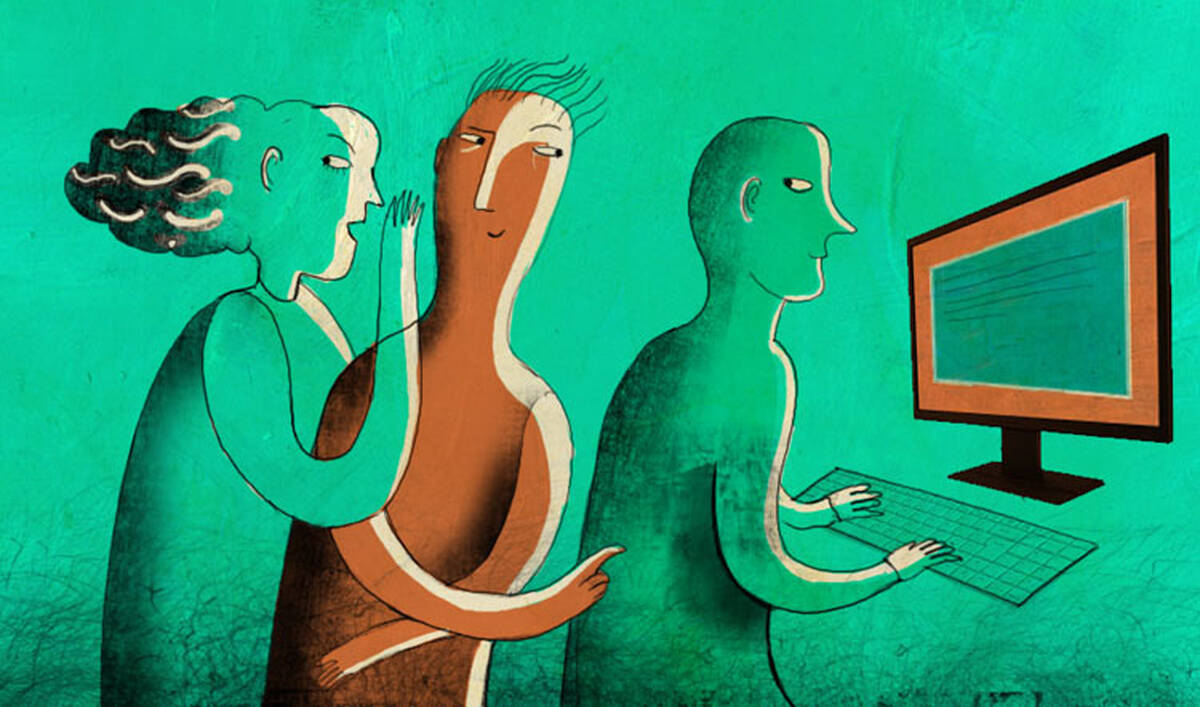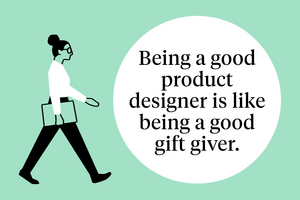A few days later, a colleague recommended the same film. Then Uzzi passed a group of undergraduate students, chuckling about it.
So when some visiting students asked him what they should do over the weekend, Uzzi confidently recommended The Big Sick—a movie that he himself had never seen.
It was a textbook example of a phenomenon that scholars, Uzzi included, are working to make sense of: how word-of-mouth snakes through diverse social networks and influences consumers’ decisions along the way.
As digital marketing continues to evolve and subsume traditional avenues, Derek Rucker, a Kellogg marketing professor who also studies the phenomenon, expects that psychologists and advertisers alike will depend heavily on a thorough understanding of word of mouth.
“Marketers have a massive need to better understand the dynamics of word of mouth,” he says.
Why Do We Give Advice?
Why do people feel compelled to offer advice?
Rucker recently had a conversation with a colleague about that question.
“A prominent explanation is that word of mouth arises due to empathy or altruism. You can think of it as word of mouth being largely a result of people’s desire to help others out,” he says. “But our conversation kept leading us back to a nagging question: ‘Is that the only reason?’”
He wondered if alternative psychological dynamics might be at play. In earlier research, Rucker had shown that people’s consumption behavior can be motivated by a desire to offset threats to their sense of self. Rucker and his colleagues wondered if a similar motivation might shape consumers’ word-of-mouth recommendations. Specifically, are people more likely to offer advice when they feel like they have lost control over their lives and wish to reassert it?
To find out, Rucker and three coauthors—Alessandro Peluso of University of Salento, Matteo de Angelis of Libera Università Internazionale degli Studi Sociali, and former Kellogg doctoral student Andrea Bonezzi, now a faculty member at New York University—designed a study that allowed them to influence how “in control” participants felt, and then examined how participants’ propensity to offer advice changed as a result.
One experiment began with participants being randomly assigned to write a short essay about a moment when they felt they had either no control over their lives or full control over their lives. The idea behind this manipulation is that it would affect participants’ temporary need for control. Participants then wrote about a positive experience they had had with a product, as if they were sending an email to a friend.
Research assistants combed through the responses, noting those that merely stated an opinion (e.g., “This keyboard is easy to install”) versus those that offered advice (e.g., “You should buy this keyboard”). The researchers found that the group with a diminished sense of control was 20 percent more likely to offer explicit advice than their in-control counterparts.
“So, this work suggests word-of-mouth behavior can be shaped by motives beyond altruism and empathy. A need for control can lead people to shift from sharing opinions to giving advice. ” Rucker says.
Rucker’s findings provide insight into the psychological dynamics that may drive word of mouth. Of course, one might wonder if these results suggest that marketers should attempt to instill a lack of control in consumers to increase advice giving. Rucker notes that, as with any psychological insight, the ethical responsibility ultimately falls to the companies themselves.
“What we hope is that, on average, people want to be successful in business because they’re doing it the right way,” he says.
When Word-of-Mouth Marketing Works
Rucker’s study looked at why people offer advice; in another paper he and Uzzi looked at what consumers do with that advice. After all, advice from others can be useful because making decisions requires the brain to sort through loads of information.
“It’s easier, in many ways, to allow your friends and the people around you to make those kinds of choices for you,” Uzzi says.
But under what circumstances do we actually let others’ opinions influence our decisions? To find out, Uzzi and Rucker turned to Hollywood.
The research team, which included three coauthors—Sarah Soderstrom of University of Michigan, James Fowler of University of California San Diego, and Daniel Diermeier of University of Chicago—looked at how buzz leading up to a Hollywood film’s release affects whether people go to see the film in its opening weekend.
The distinction between pre-release versus post-release chatter is important. Pre-release word of mouth is usually assumed to be less useful than post-release word of mouth, as it is necessarily speculative—the movie has not yet been released. However, the researchers hypothesized that pre-release chatter could still have a significant influence on consumer choices, if it surpassed a certain threshold.
This hypothesis was based on earlier research from Uzzi and Soderstrom, looking at social networks. They found that some 85 percent of individuals run in a small number of social circles, but the remaining 15 percent have a large and varied network of connections and are therefore highly influential because their opinions reach so many groups.
The authors theorized that, in order for a movie to take off, buzz would have to reach those influencers and they would need to start spreading it throughout their own circles. The influencers are a tough group to get talking about a film—“If they send bad information, they’ll lose their central position,” Uzzi says.
To put this theory to the test, Uzzi, Rucker, and their colleagues used marketing data on more than 300 Hollywood movie releases. The data came from a survey conducted between 1998 and 2001 by a film-production company, where respondents were asked whether their friends had been talking about a particular movie in the week before its release.
Using this data, the researchers plotted the portion of respondents who had heard word of mouth against each film’s opening box office revenue. After controlling for other factors (the film’s budget, the number of theaters showing it, the presence of an A-list star, etc.), they analyzed how different levels of pre-release word of mouth affected box-office returns.
The results were consistent with their hypothesis. For films being talked about by only a small fraction of the population, every additional bit of pre-release word of mouth had a tiny impact at the box office. But once a film permeated a certain mass of survey respondents—about 21 percent—there was a much stronger connection to ticket sales. Pre-release word of mouth suddenly had four times the effect.
For example, less than 15 percent of the respondents had heard about the 2000 Renée Zellweger vehicle Nurse Betty before its release—meaning the influencers were most likely not reached, and word of mouth never picked up momentum. On the other hand, 2001’s Pearl Harbor, which nearly half of survey respondents had heard about, likely permeated many influential social networks, and therefore reaped four times the returns from every additional percent of pre-release chatter. (Indeed, the film’s explosive $59 million opening weekend did not disappoint; nor did Nurse Betty’s $7 million opening weekend come as a surprise.)
To confirm that the success of hits like Pearl Harbor stemmed from the work of these influencers, the researchers also created a computer model of the word-of-mouth process. In the model, potential adopters interacted with friends in their network according to the “rules” of influence suggested by Uzzi and Soderstrom’s original social-network analysis. The output from the model closely reproduced the same adoption patterns as seen in the real data.
Uzzi and Rucker were both struck by the surprising power pre-release word of mouth can have on consumers under the right circumstances. The study suggests that if marketers want to penetrate a broad range of social circles, they first need to reach the influencers who move between them.
“People who can bring different groups together are a big deal,” Uzzi says.
Next Up? Yelp Reviews and ROI
These insights have raised other questions that the authors hope to tackle soon.
Rucker, along with Kellogg postdoctoral student Matt Rocklage and Associate Professor of Management Loran Nordgren, is currently conducting a study to understand how emotion manifests in word-of-mouth language.
“We’ve basically developed an advanced lexicon or dictionary that can assess how emotional a consumer’s response is,” he says—for example, by comparing the individuals who use the word “awesome” versus the word “perfect” in their Yelp reviews for a particular restaurant.
In his future work, Uzzi wants to compare the returns that brands can expect from word-of-mouth campaigns to returns from more traditional marketing techniques.
“It would be great to be able to quantify the degree to which advertising versus social-network information influences someone’s decision,” he says.
What is undoubtedly clear is that word-of-mouth communication—from Facebook to Yelp to Rotten Tomatoes—is only going to grow.
“A decade ago, for a lot of my decisions, I’d call up some close friends and ask, ‘What do you think about this product or movie?’” Rucker says. ”Nowadays, I find myself influenced not by close connections, but by a large number of broad connections scattered across the web.”




